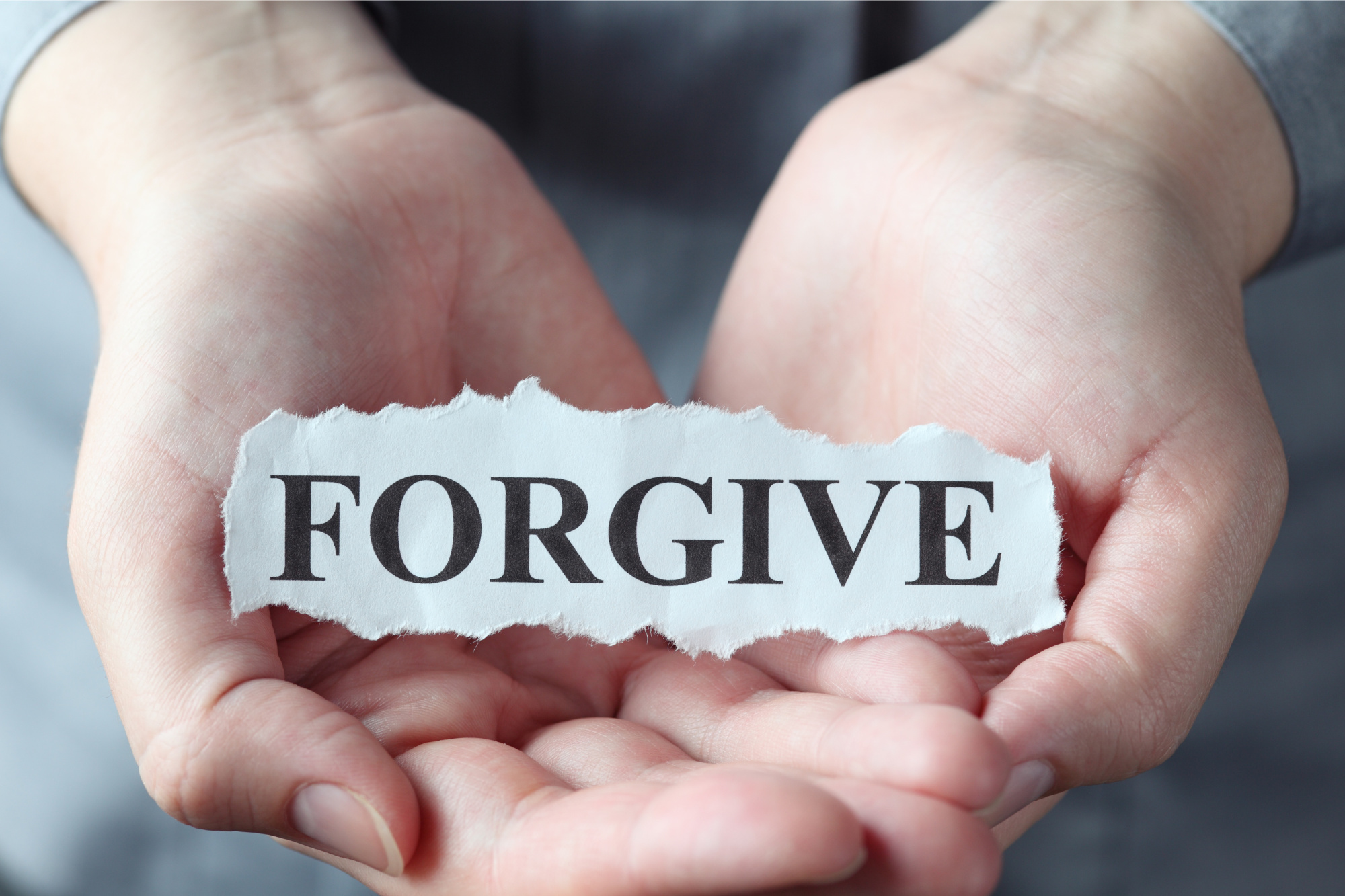
How To Forgive And Let Go After Divorce
No matter how you look at it, divorce is painful. Your life (and the lives of your children) are changed forever. And for a time you must face challenge after challenge – a seemingly endless stream of them. Yet you know you must continue to move forward so you persevere and eventually ask yourself the question, “How can I forgive and let go of all the hurt?”
This question is important because it’s at the core of all the pain you’re experiencing over your divorce. It’s also one of the most difficult challenges of healing after divorce because divorce brings with it so many hurts, betrayals, and lost dreams.
So let me walk you through how I help my clients learn how to forgive and let go after divorce.
The first step is to truly understand what forgiveness is.
What is forgiveness?
Simply put, forgiveness is a conscious decision to release your feelings of resentment, hurt, anger, or vengeance toward a person or group who has harmed you.
What I like about this definition is that it’s all about you. It’s not about waiting for the person or people who harmed you to make amends.
There’s power in this. It means that letting go and moving on after your divorce is up to you. Sure there are probably circumstances that are dependent upon others, but your being able to forgive is completely within your control.
However, something being 100% in your control doesn’t mean that it’s necessarily easy to achieve. I’ll bet if you’re like most of the people I’ve spoken with over the last nearly 20 years, that you have some resistance to forgiving.
Why do so many struggle with it?
Being able to forgive and let go after divorce is often problematic because of mistaken beliefs. It’s fairly common to erroneously believe that forgiveness has to do with the other person or group. This belief completely removes an individual’s ability to move forward.
Waiting for someone else to make you feel better about your divorce is a recipe for staying stuck.
You stay stuck when you continue to replay the harm you experienced and the resultant resentment, hurt, anger, and desire for vengeance again and again. You’re holding on to it and in a way nurturing it so that your pain never has a chance to dissipate. Instead, it remains and often grows.
This way of coping with being harmed makes sense from an evolutionary perspective. Back in the days of living in caves, our ancestors needed to know who they could trust because their lives depended on it – literally.
However, today we don’t necessarily need to continually remind ourselves of the harm done to us.
The other reason so many struggle with forgiveness and letting go after divorce is that we mistakenly believe that to forgive means to forget and act as if the harm never happened.
So let’s revisit the definition of forgiveness from above and please pay close attention to what you’re reading…
…forgiveness is to consciously decide to release your feelings of resentment, hurt, anger, or vengeance toward a person or group who has harmed you.
Nowhere in this definition is there anything about forgetting or dismissing or even condoning. In fact, remembering the hurtful actions and learning how you can prevent or avoid or in some other way keep yourself from being hurt in the same way in the future is what you should be learning from the situation.
And I’ll bet that even with all of this discussion about what forgiveness is and why so many struggle with it that you might be thinking one of two things:
- I can’t forgive my ex.
- I can’t forgive myself for hurting my ex.
So let’s take a look at both of these thoughts.
I can’t forgive my ex.
If you’re struggling to forgive your ex for the end of your marriage, chances are that you’re blaming them for everything that’s happened. And you’re partially correct. They are to blame – for their part.
The uncomfortable truth is that you’re also culpable. You have some fault for the end of your marriage too.
It’s worth taking the time to look at how you contributed to your divorce. At a minimum, you are responsible for deciding to marry your ex. But, I’ll bet that if you let yourself really think about it, you’ll see that you played a little bit larger role than that.
I don’t say that to condemn you. I say it because I know it was true for me and it’s been true for each and every one of the hundreds of people I’ve worked with.
In my case, one of the ways I contributed to the end of my first marriage was the expectation that my husband would just know what I needed without my needing to tell him. It was easy to blame him for not caring about me. But the truth is that I didn’t tell him what I needed and how I wanted things to change.
And, yes, it did take me some time to be able to admit this to myself. Yet when I did, it was easy to forgive him because I knew that I wasn’t solely a victim of his actions. I was also a victim of mine.
This idea of being a victim of your actions brings us to the second struggle that so many people have with knowing how to forgive and let go after divorce.
I can’t forgive myself for hurting my ex.
If you’re struggling with forgiving yourself for hurting your ex with your decision to divorce, you’re not alone. Most people who initiate divorce blame themselves for the pain they caused.
I’ll bet making the decision to divorce was one of the most difficult decisions you’ve ever made. You probably weighed all kinds of considerations before finally deciding this was the best course for you and your family.
And it’s good that you still care for your ex and what they’re experiencing as a result. Yet, the truth is that you’re not responsible for how your former spouse feels (and you never were).
Another unfortunate fact is most people find forgiving someone else easier than forgiving themselves.
I believe there are 3 primary reasons for this:
- It’s easier to see how someone else has caused us harm (and it can be easier to feel like a victim) than it is to recognize how we may have caused ourselves or someone else harm.
- It can also be difficult to forgive ourselves because it takes effort and sometimes it can seem easier to wallow in guilt and regret.
- We can hold ourselves to a higher level and breadth of accountability than we do others.
Yet despite all the struggles that you may have with allowing yourself to forgive and let go after your divorce, it is possible to do. In fact, I believe you must do so before you can fully move on with your life.
Tips for reaching forgiveness
So far we’ve spent a lot of time talking about forgiveness and why it can be difficult to do. Let’s shift gears now and talk about some tips for how you might be able to finally forgive and let go.
To forgive someone else, you might try these tips:
Get distance from the event
For most of us, it’s nearly impossible to forgive someone while we’re feeling hurt.
If you can give yourself a little time so you can look at the situation from different angles, you’ll find that your perspective of the event and its meaning can change. It’s this change in perspective that can often provide the space to forgive – or at least begin being willing to forgive.Be willing to do your part.
The key to being able to forgive and let go is making the choice to do so. Choosing to let go of the anger, hurt, and resentment is necessary. And sometimes the easiest place to start is to decide to be able to make this choice.Work through your feelings.
As inconvenient as they may be, you must acknowledge and work through your feelings about the hurt. A couple of ways you may choose to work through them are journaling and talking to a trusted friend, family member, or helping professional. – journaling, talkingFind the silver lining of the hurt.
Yes, there really could be a silver lining to your divorce. It might allow you and your ex to be better parents. It might allow you to pursue passions you laid to the side when married your ex.
By being willing to look for the opportunity to grow from your divorce and/or recognizing your relationship wasn’t what you thought it was, you’ll quickly be able to find your silver lining.Build your capacity to forgive.
Start with forgiving smaller things first to build up your forgiveness capacity. Then you can progressively build up to forgiving your ex for the divorce and all of its repercussions.Acknowledge your forgiveness.
Take the time to recognize that you’ve been able to forgive and let go of any portion or part of the hurt you carry because of your divorce. When you do, you’re celebrating yourself, your growth, and taking a giant leap toward putting your divorce behind you.
To forgive yourself, in addition to the tips above, the following can be helpful:
Recognize if you’re holding yourself to a higher level of accountability than you do others.
Have you heard of an inner critic? Most of us have met our inner critic even if we don’t know it by that name. It’s the negative, nagging, judgemental voice that keeps replaying our faults and shortcomings.
Our inner critic is the part of us that unreasonably holds us to a higher level of accountability than others. Once you can separate the excessive condemnation from an appropriate level, it becomes easier to forgive yourself.Change your negative thoughts.
We all have a negativity bias. We look for what’s wrong. And this can cause us to be hard on ourselves and makes it difficult to forgive and let go.
When you catch yourself allowing negative thoughts to control how you feel about yourself, it’s time to change them. One of the most straightforward ways to do that is to ask yourself if the thought is based on fear or love. If it’s fear, then you can change it by looking for a loving, kind way to reframe the thought.
Learning how to forgive and let go after divorce will take time and effort. Yet the investment you make in doing so will enable you to move on with your life and be more fully you as you build a meaningful and love-filled life after divorce for yourself (and your kids).
I’m Dr. Karen Finn, a divorce and life coach. I help people just like you with healing after a divorce or breakup. You can join my newsletter list for free weekly advice. If you’re interested in taking the first step toward working with me, you can schedule an introductory private coaching session.
Looking for more information about getting over the end of your marriage? You’ll find what you’re looking for in Healing After Divorce.
Related Posts:
How To Get Over An Unwanted Divorce
Guessing how to get over an unwanted divorce is virtually impossible. Learn the 9 best realistic and practical tips to help you heal from an unwanted divorce.
Read MoreHow To Get Over An Unfair Divorce
When you’re ready, you can use this straight-forward strategy for how to get over an unfair divorce and start living your life again.
Read More5 Incredible Factors You Must Consider When You Divorce Later in Life
FacebookTweetPin Divorce is no walk in the park at any age. But, when you are older, it can be particularly painful. To help you with this tough transition, here are a few important tips. Meeting New People Friendships outside of your marriage may be affected by your divorce. It can force friends to choose sides…
Read More


